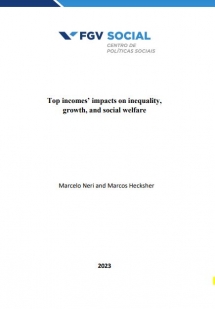
Top incomes’ impacts on inequality, growth, and social welfare (in english) - Neri, Marcelo Cortes, HECKSHER, Marcos
Sobre o paper:
Abstract: This paper evaluates the impacts of combining household surveys with income tax return files, in terms of growth, inequality, and social welfare in Brazil from 2007 to 2015. This exercise holds the promise of adding more realistic top income values to traditional surveys. While the previous literature focused on the impacts of these data combination exercises on income inequality, we assess their cumulative welfare implications. First, as the level of inequality rises when higher top incomes replace previous estimates from surveys, this exercise also increases by construction the mean and social welfare levels. Second, while the movement of these combined estimates presents a slower inequality fall than pure surveys, mean and social welfare growth is seen to have been faster. We are able to reconcile most of the aggregate discrepancies between income tax returns, surveys, and GDP growth rates but demographic inconsistencies still remains. Finally, the paper analyses the nature and causes of a series of measurement issues—in particular, why exempt incomes drove the growth in income tax returns during this period.
Keywords: Top incomes income inequality, personal income tax records, combining data sets, Pareto interpolation
JEL classification: I31, H2, H22




